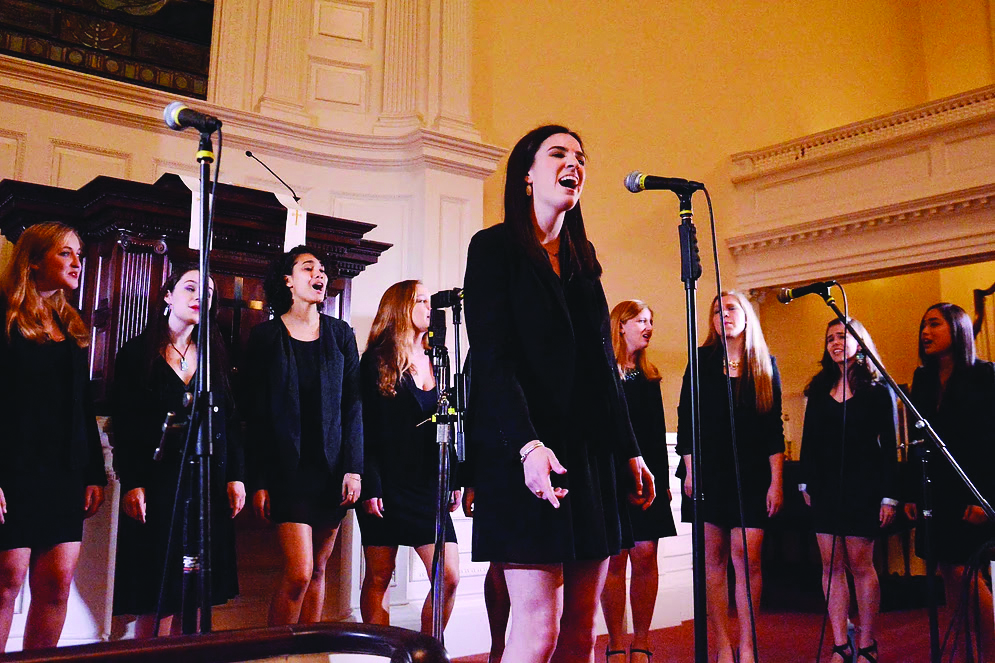
The New Blue
Campus a cappella groups watched with interest as the Whiffenpoofs and Whim ’n Rhythm announced last week that they would consider accepting singers of all genders.
The Whiffs will now identify as “TTBB” — or tenor I and II, baritone and bass — and Whim as “SSAA” — soprano I and II and alto I and II — instead of “all-male” and “all-female.” The reforms, which are designed to address historic inequalities between the groups, also include a joint website, more closely integrated business teams and an option for members of Whim to take leaves of absence to tour.
Reactions to the news in the Yale singing community have been largely positive, although several students interviewed noted that some may have misunderstand the nature of the reforms.
“This is about equity,” said Folasade Kammen, a member of The New Blue who auditioned for both the Whims and Whiffs. “Whim and Whiffs do not offer the same levels of opportunity, and other facets of the decision — namely, the sharing of profits — help level that out. The idea that the groups have ‘gone coed’ isn’t really true, but there is now the opportunity for people anywhere on the gender spectrum to be in the group in which their voice best fits.”
Theoretically, the new gender reforms will allow female tenors to join the Whiffs and male altos to join the Whim, according to the Whim ’n Rhythm Business Manager and former Co-Editor-in-Chief of the Yale Daily News Magazine Gabriella Borter ’18 and Whiffenpoofs Music Director Kenyon Duncan ’19.
But Kammen noted that only a small contingent of women sing tenor or lower. Sophia Campoamor, a member of the Mixed Company, who this week auditioned for both the Whiffs and Whims, told the News that, by choosing not to change the musical configuration of the groups, the Whiffs will likely remain overwhelmingly male and Whim overwhelmingly female, meaning that senior a cappella will continue to be “a heavily gendered experience.”
Agreeing that gender inclusivity will only be achieved with ongoing discussion and mindfulness from the groups, some members of Yale a cappella groups said they believe the Whiffs and Whims’ decision is a step in the right direction.
“Whether trans, gender non-binary or gender non-conforming people will feel comfortable in such spaces merely by changing the description is not something I can speak on behalf of, but I am glad that opening the Whiffs and Whim to all genders creates space for those who do not identify as men or women to sing a cappella,” Campoamor said.
Noting that Mixed Company met for several hours to craft a group statement when the Whiffs and Whim invited the Yale community to send feedback on gender inclusivity, Campoamor told the News that the process of critiquing a senior a cappella group helped begin conversations about Mixed Company’s own relationship with gender and class.
Hale Jaeger, a member of the Yale Alley Cats, told the News that the Alley Cats have had three gender nonbinary members in the past 10 years and that he is glad to see other groups, “especially high-profile groups like Whim and the Whiffs,” making similar strides.
“The Whiffs’ decision definitely serves as a catalyst for a conversation that all of the single-gender groups should have about how they want to handle rush moving forward,” said John Auen, a member of the Baker’s Dozen. “I don’t think there is any one panacea — whether allowing all genders but remaining TTBB/SSAA, switching to SATB or some combination — but it’s something that members of underclassman groups need to discuss with each other as well as their alumni in the coming years.”
There are now only four all-male a cappella groups on campus — The Alley Cats, The Baker’s Dozen, the Society of Orpheus and Bacchus and the Spizzwinks — and three all-women groups, The New Blue, Proof of the Pudding and Something Extra.
Some of those groups have chosen to stay silent on the issue. Nick Massoud ’19, business manager of the Spizzwinks, declined to comment for this story. And one member of the Society of Orpheus and Bacchus noted that some singers feel it is not their place to comment on decisions by another group or fear that a public comment could affect their chances of getting into the Whiffs.
The Whiffenpoofs were established in 1909, while Whim ’n Rhythm was founded in 1981.
Britton O’Daly | britton.odaly@yale.edu
Serena Cho | serena.cho@yale.edu







